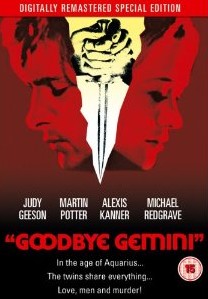'GOODBYE GEMINI' (1970)

- A review by Richard Harrison (2010)
It’s sometimes depressing to be right. Having watched Goodbye Gemini
I experienced that very seemingly contradictory sensation as I looked
the film up (a habit I have long got used to) in Halliwell’s Film
Guide. True, Leslie Halliwell himself could not have seen all the
films within the bulging pages of the book that bears his name (he did,
after all, go to that great picture house in the sky in 1989), but
sometimes the reviews within are very, how shall we say,
‘Halliwell-esque’. A case in point is that of Goodbye Gemini, a
film he describes as an ‘abysmally over-the-top melodrama with a
swinging London backdrop’, following this up with ‘its immaculate
appearance only makes it worse’. As will be evident from my opening
comments, I had predicted this reaction- though purely from my
experience of Halliwell as notoriously ‘un-hip’ rather than from any
evidence inherent in the film itself. In fact, the film itself
generated the very opposite reaction in me- it is certainly no
undiscovered masterpiece, but it is very much a cult classic,
its strengths for me far outweighing the weaknesses which Mr.
Halliwell, with his usual disregard of ‘swinging’ films of this type,
perceived.
Despite my assertion that Leslie Halliwell was unduly curmudgeonly in
his dismissal of what is actually a pretty good film, he was correct on
several counts. Firstly, the film is undeniably ‘swinging’- it captures
London on the very cusp of the 1970s in all its hedonistic camp (‘no
holds barred in SW3’ as one character puts it). Secondly, the film is
unquestionably ‘immaculate’ (taking ‘immaculate’ to mean pristine,
beautiful, sleek). This is not entirely surprising, as the stylish
cinematography belongs to Geoffrey Unsworth- veteran of seven decades
of film whose c.v. includes such visual treats as Scott of the
Antarctic(1948), Becket(1964), 2001, A Space Odyssey
(1968), and the first two original Superman films starring
Christopher Reeve. Coupled to this experience is director Alan Gibson,
whose work helped outline television drama in the 1960s, 1970s and
1980s (the best known perhaps being the two Dominick Hyde plays in the
early 1980s). Thirdly, a point not mentioned by Halliwell, is the
highly interesting cast, which ranges from the nymph-like Judy Geeson
and the striking Martin Potter to the stately Michael Redgrave and
character actors like Peter Jeffrey and Brian Wilde. So, we have a film
with an experienced drama director, a fine (if slightly unorthodox)
cast, and a fine cinematographer. It is then a case of what they do
with the plot.
It would be cruel- malicious even- to outline the intricacies of the
plot of Goodbye Gemini. Suffice to say Julian (Martin Potter)
and Jacki (Sally Geeson) are brother and sister who arrive in London,
strangers to the big city. There they soon meet Clive Landseer (Alexis
Kanner), someone who takes an interest in both of them. During heady
parties (frequented by faceless ‘swingers’ as well as more defined
characters like the uber-camp Nigel Garfield (Terry Scully) and James
Harrington-Smith (Michael Redgrave), the trio are joined by Denise
Pryce-Fletcher (Marion Diamond) and a tete-a-tete (twice over) ensues.
However, things are not as they seem- even Agamemnon (Jacki’s dark
teddy bear) seems to be hiding a secret.
To compliment what is an unusual and at times very gripping slice of
swinging British cinema (criminally unavailable on any format prior to
this release), this Odeon Entertainment special edition features a host
of excellent extras. These include a terrific audio commentary with
Judy Geeson and Producer Peter Snell, a featurette, trailer and stills
gallery. Goodbye Gemini is well worth both time and money, and,
for me, the late Leslie Halliwell used the right evidence to come to
the wrong verdict.
Goodbye Gemini is available in May 2010 from Odeon
Entertainment.
Odeon Entertainment website
Back
Home

